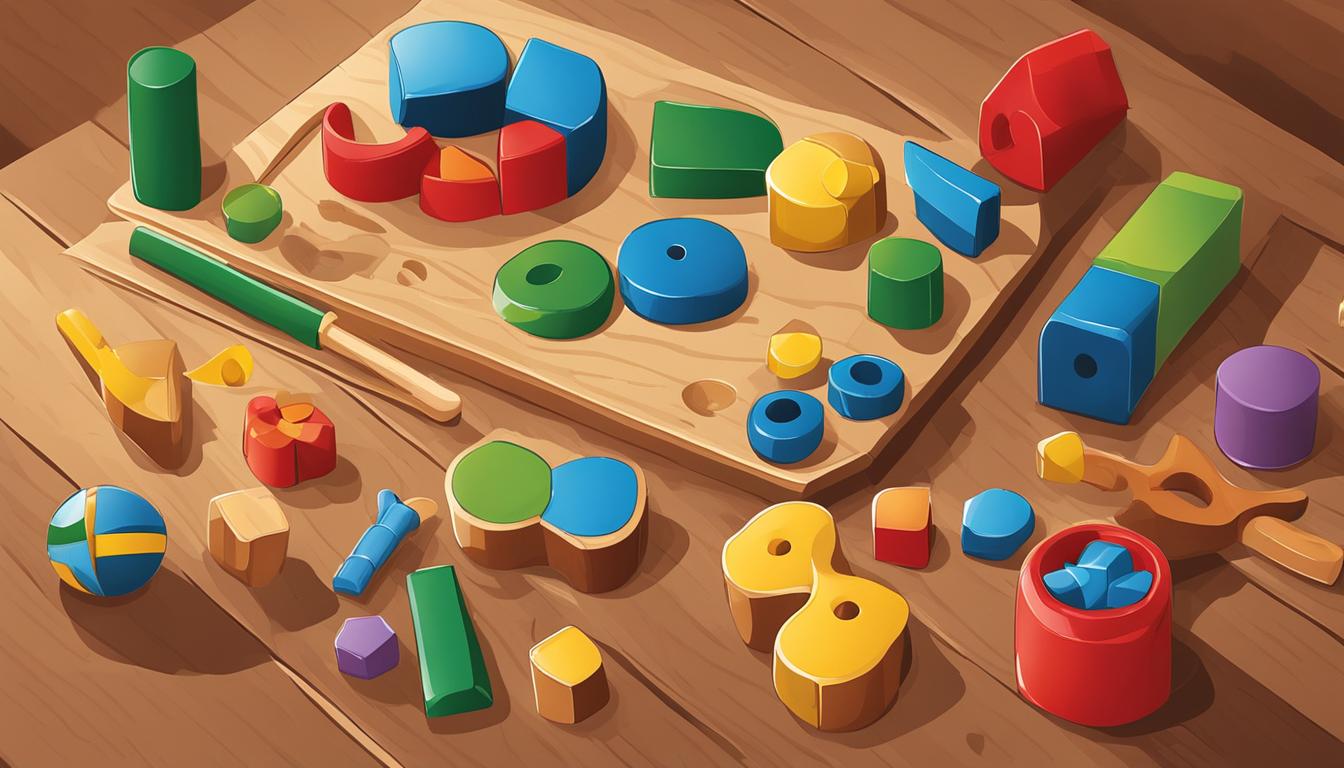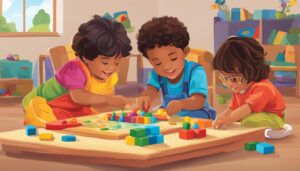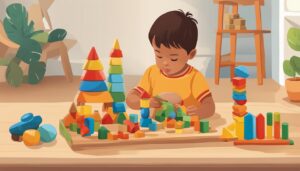Montessori toys are playthings that align with the Montessori learning philosophy. These toys are carefully selected based on specific characteristics. They ignite a child’s curiosity through repetition and purpose, reflecting their daily experiences. Montessori toys are designed to promote engagement, independent exploration, problem-solving, and skill development. They prioritize open-ended play and meaningful connections between actions and consequences. These toys use natural materials and sensory-rich experiences to foster sensory stimulation and cognitive development. Montessori toys also follow the principles of simplicity, minimal distractions, and age-appropriate challenges. They encourage independence, self-sufficiency, and hands-on learning. Overall, Montessori toys offer an engaging and purposeful play experience for a child’s natural development and learning.
Key Takeaways:
- Montessori toys promote engagement, independent exploration, problem-solving, and skill development.
- These toys prioritize open-ended play and meaningful connections between actions and consequences.
- Montessori toys use natural materials and sensory-rich experiences to foster sensory stimulation and cognitive development.
- They follow the principles of simplicity, minimal distractions, and age-appropriate challenges.
- Montessori toys encourage independence, self-sufficiency, and hands-on learning.
Please note the image placement may vary depending on the layout of the webpage.
Benefits of Montessori Toys
Montessori toys offer numerous benefits to children’s development and learning. These playthings are specifically designed to enhance various skills and foster a holistic play experience.
Promotes Practical Life Skills and Self-Sufficiency
Montessori toys encourage hands-on learning, promoting practical life skills and independence in children. By engaging with these toys, children learn essential skills such as problem-solving, decision-making, and self-reliance. They develop a sense of accomplishment and confidence as they tackle age-appropriate challenges.
Nurtures Problem-Solving Skills and Curiosity
Through open-ended play, Montessori toys foster problem-solving skills and ignite curiosity. These toys encourage children to explore, experiment, and find solutions independently. By engaging in activities that require critical thinking, children develop their problem-solving abilities and cultivate a mindset of exploration and curiosity.
Enhances Focus, Attention Span, and Concentration
Montessori toys engage children in activities that require their full attention. As they concentrate on using these toys and completing tasks, children develop focus and improve their attention span. This heightened concentration serves as a valuable skill for future learning and academic success.
Improves Motor Skills and Hand-Eye Coordination
Manipulating and interacting with Montessori toys enhances children’s motor skills and hand-eye coordination. Whether they are stacking blocks, threading beads, or maneuvering puzzle pieces, children develop fine and gross motor skills through hands-on play. These physical movements contribute to their overall physical development.
Offers Educational Value and Cognitive Development
Montessori toys not only provide entertainment but also have significant educational value. These toys support cognitive development by offering concrete opportunities for children to learn important concepts. They learn cause and effect, spatial relationships, sensory experiences, and much more through play. Montessori-aligned toys promote learning in a fun and engaging manner.
| Benefits of Montessori Toys |
|---|
| Promotes practical life skills and self-sufficiency |
| Nurtures problem-solving skills and curiosity |
| Enhances focus, attention span, and concentration |
| Improves motor skills and hand-eye coordination |
| Offers educational value and cognitive development |
Montessori Toy Selection and Principles
When it comes to selecting Montessori toys for your child, it is crucial to adhere to certain principles. These toys should have a simple design, devoid of unnecessary distractions, allowing your child to focus on one skill or concept at a time. By doing so, they can fully engage and concentrate on their learning experience.
Montessori toys prioritize the use of natural materials such as wood, metal, cotton, and glass. These materials offer a sensory-rich experience, fostering a tangible connection to the real world. By engaging with these natural materials, your child’s senses will be stimulated, promoting their cognitive development and overall learning.
Additionally, it’s essential to choose Montessori toys that are age-appropriate for your child. These toys should provide a challenge without causing frustration. Striking the right balance will ensure that your child remains motivated and engaged in their play, fostering a positive learning environment.
As you curate your child’s playroom, it’s recommended to have a rotating selection of 8-10 Montessori toys. This approach promotes independent play and reduces the likelihood of toy boredom. By following these principles and selecting Montessori-aligned toys, you will create an optimal play environment that fully supports your child’s natural development and learning.
FAQ
Q: What are the characteristics of Montessori toys?
A: Montessori toys have specific characteristics that align with the Montessori learning philosophy. They are carefully selected to promote engagement, independent exploration, problem-solving, and skill development. These toys prioritize open-ended play and meaningful connections between actions and consequences. They use natural materials and sensory-rich experiences to foster sensory stimulation and cognitive development.
Q: What are the benefits of using Montessori toys?
A: Using Montessori toys in a child’s playroom has several benefits. These toys promote practical life skills and self-sufficiency, nurture problem-solving skills, enhance focus and attention span, improve motor skills and hand-eye coordination, and provide educational value by supporting cognitive development, sensory stimulation, and overall learning.
Q: What principles should I follow when selecting Montessori toys?
A: When selecting Montessori toys, it is important to choose toys that are simple in design, free from unnecessary distractions, focus on one skill or concept at a time, use natural materials, and are age-appropriate and challenging but not frustrating for the child. It is also recommended to have a rotating selection of 8-10 Montessori toys in a child’s playroom to promote independent play and reduce toy boredom.





